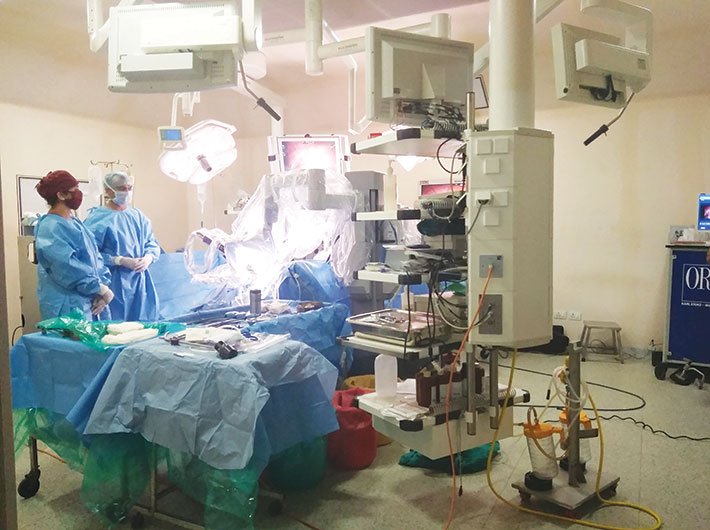The Institute of Kidney Diseases and Research Centre in Ahmedabad shows the way to taking high-quality healthcare to the poor
Since the noughties, surgeons have been performing and advocating surgery that accesses internal organs through the body’s natural orifices. Such procedures are called natural orifice transluminal endoscopic surgeries (NOTES) and access internal parts through the mouth, anus, or vagina. They are used to both repair or remove diseased organs and retrieve healthy ones from donors. Three years ago, surgeons in Spain achieved the first renal transplant via the vagina. India has caught up, and in the intervening years, some hospitals in India have been preforming trans-vaginal kidney transplants. Among them is the Gujarat government-run Institute of Kidney Diseases and Research Centre (IKDRC), Ahmedabad, deemed an institute of national importance by the department of science and technology.
“The vagina is elastic and strong enough to push a baby out during pregnancy. The kidney is smaller than a baby’s head and can easily be put into or taken out from the abdomen via the vagina,” says Dr Pranjal Modi, head of the department of urology & transplant surgery, IKDRC. “The procedure is done by a robot – the daVinci robot – which surgeons control from a console.”
The advantages of surgery via natural orifices go beyond the merely cosmetic: patients feel much less pain, they recover early, there is much less scope for secondary or tertiary infection. And, of course, there are no external scars.
The daVinci robotic system, devised in the US and approved by the US Food & Drugs Administration in 2000, carries out complex surgeries with minimal invasion. In men, the daVinci can perform kidney transplants with an incision six cm long, as opposed to the 15-25 cm incision required in conventional surgery. “Kidneys are roughly 11 cm long and five cm wide, and a six cm incision is enough to retrieve them from or place them in the body,” says Dr Modi.
The institute claims the record for the highest number of robotic kidney transplants in the world – 402. Since its setting up in the 1980s, the institute has carried out nearly 5,400 kidney transplants, via conventional and robotic surgery. Its surgery teams have also carried out 183 laparoscopic transplants. Dr Modi first trained for robotic surgery in Chicago, and imparted training to surgeons at IKDRC. The institute director, Dr Veena Shah, says it has conducted the highest number of renal transplants among government hospitals in India.
Kidney transplants are commonplace. But patients undergo severe pain and financial stress. Private hospitals charge Rs 8 lakh-25 lakh for kidney transplants. Here is where government hospitals make a huge difference. The IKDRC, for instance, charges about Rs 5 lakh for a kidney transplant, pre-operative investigations, pre-operative haemodialysis, surgery charges, disposables, drugs and hospital stay inclusive. Patients with family income of less than Rs 3 lakh per year can avail themselves of free treatment under the Gujarat government’s Mukhyamantri Amrutam scheme. The IKDRC has treated nearly 5,000 BPL card-holders and more than 8,000 patients from low income groups under various aid schemes of the government.
Says Dr Shah, “The philosophy behind setting up this institute was to bring modern medical care to patients with limited or no financial recourses. By and large, we have been successful. About 60 percent of our patients are admitted, investigated or operated upon at either no cost or at a concession. The hospital bears an annual burden of Rs 10 million on account of this.
Against this, our revenue consists mainly of donations from charitable and philanthropic organisations and individuals. The state government supports us by bearing 80 percent of the institute’s salary expense.”
Conceptualised in 1981 by the visionary Dr HL Trivedi, who left a lucrative practice in the US to make the institute his life work, the IKDRC was made autonomous 250-bed hospital in 1992. In 1997, an Institute of Transplantation Sciences was established as its sister institute, which later became, in 2015, the world’s first university for organ transplants. The IKDRC now has 400 beds, to be exanded to 800 beds. With that, the institute will move from the New Civil Hospital campus to a new premises that is under construction. The institute will soon offer PhDs in transplantation immunology and technical courses for dialysis and related lab work. The latter courses will help staff and expand the dialysis centres (now 38) the institute manages across Gujarat. These centres perform two lakh dialyses every year at Rs 3,000 each.
“We get nephrology, urology and transplant patients from Rajasthan, Maharashtra, Uttar Pradesh, Madhya Pradesh, Bihar and even from overseas. You can imagine the pressure,” says Dr Shah. However, unlike other government hospitals, patients do not have to wait too long for transplants. “There are two reasons for this. One, we have all resources, including best machinery and practitioners. Second, cadaver donors are available easily in Gujarat.”
swati@governancenow.com
(The article appears in the August 15, 2018 issue)

